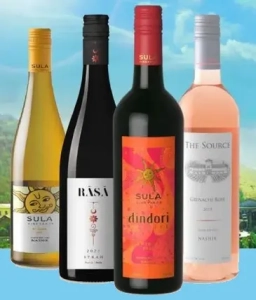
UP Cabinet meeting- Credit-PTI
Posted: Thursday, 21 December 2023 11:30
UP increases Duty on Fortified Wines in Excise Policy 2024-25

Perry is an alcoholic beverage made of fermented pear juice using a process similar to apple cider. Perry varieties come from France and England and often contain higher tannins and acids than dessert pear varieties.
“While manufacturing of wine from fruits has started, this policy would help increase the variety,” said state Excise Minister Nitin Agrawal, adding two wine plants are already coming up in Muzaffarnagar and Meerut. “The government is hopeful of more players showing interest in making fruit-based wine,” he added.
Also Read : UP becomes latest Wine producing Indian State
While clarifying the new policy, the State Excise Commissioner Senthil Pandian C also said that various categories of country-made liquor in the state have been done away with and now only four categories remain.
“Two years ago, UP-made liquor category was included in the excise policy, which was a grain-based liquor with 42.8 per cent strength. Now, new categories have been added and these include liquor from molasses, which is 25 per cent and 36 per cent strength (alc by volume), along with grain-based liquor of 36 per cent strength”, according to a Statement.
The meeting of the Uttar Pradesh Cabinet, presided over by Chief Minister Yogi Adityanath, was held on Tuesday to discuss the Excise Policy for 2024-25. The meeting also cleared the sale of liquor at airports, metro and railway stations, and cruise ships. The government hopes to mop up an ambitious and record excise revenue in excess of Rs 58,000 crore during the next policy year.
The new Excise Policy in Uttar Pradesh for 2024-25 (1 April to 31 March) will also allow people to consume beer at the premises next to the shop if the vendor allocates 100 square feet space next to their vends. Hopefully, this will pave the way for serving wines too, next year in this Ahata-type (Haryana has had this policy for years) venues.
Also Read : Progressive Excise Policy for 2021-22 in UP
Liquor shop sale timings would also be extended by an hour, till 11 p.m. on 24 December as well as 31 December 31for the festive occasions when the sales are at a peak. The liquor lobby had, however been pushing for extending the closing from 10 pm to 11 pm, but this demand was rejected.
‘This is a welcome move by the government. A number of people buy beer; but they can’t find suitable places to consume it. I am planning to get a beer shop license in the coming months,’ says a liquor trader. Consumers said the new policy appears to be a good initiative.
The excise duty on wines has been kept at a reasonable 25% of MRP on Indian as well as imported wines whereas the duty on fortified wines has been increased to 40%, ostensibly due to the efforts of Wine Growers Association of India which has been advocating production with only grapes throughout India, without adding spirits.
Ashwin Rodrigues, Secretary of WineGAI says the Association is very pleased with this change. ‘Fortified wines made from molasses spirit were flooding the UP market which were nothing but spirit products in the guise of wine. We advocated an increased tax with the authorities on such products just like in Maharashtra and Karnataka, and they listened. It is a big victory for WineGAI’, he says.
Wines may be packaged in glass bottles and cans only, according to the Policy 2024-25. The shelf life must be 9 months from the day of canning and must be displayed in bold letters on the can. The producer must however certify the suitability of the wine cans for a minimum period of 12 months from the Director of CFTRI, Mysore. This should be interesting for producers like Sula, Fratelli and Good Drop who are making WIC (wines-in-can) for the moment.
High quality grapes may not be available in UP but the fruit wine can be made from several fruits and hopefully the government will extend all facilities to make them available to wine drinking
Subhash Arora




